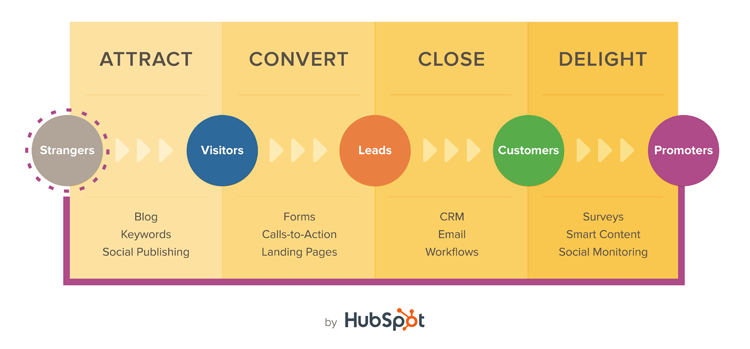The marketing industry relies on educated and spirited debates to inform our tactics and strategies. Some noteworthy debates include the importance of responsive design, the necessity of marketing automation, and the relationship between sales and marketing. While all of these discussions are ongoing, one particular debate has recently dominated the industry conversation: The difference between content marketing and inbound marketing. Both have an important place in marketing, and it’s crucial to understand how they work together to create a complete strategy.
Inbound Marketing
First introduced in 2005, inbound marketing is a fairly new term to join the marketer’s vocabulary. Its newness does not detract from its relevance, however, as it continues to rise in popularity. What is inbound marketing? The founder of HubSpot coined the term, so it is only fitting to refer to their definition of inbound marketing:
“Instead of the old outbound marketing methods of buying ads, buying email lists, and praying for leads, inbound marketing focuses on creating quality content that pulls people toward your company and product, where they naturally want to be.”
To fully understand inbound marketing, we need to take a look at The Inbound Methodology. Four actions transform individuals from prospects to promoters for your brand: Attract, Convert, Close, Delight. Through outlining clear goals and carrying out carefully timed strategies, you will be able to easily guide each person through the methodology.

As outlined by the methodology, inbound marketing is not just about content as the official definition seems to imply. It is determining what social media channels are most appropriate for your business and reaching your target audience through posts on those channels. It is utilizing good design to ensure your visitors have a quality user experience at every touchpoint with your brand. It is analyzing data to learn from your marketing and inform future decisions. Inbound marketing is viewing (and documenting) each potential customer as an individual and leading them through a personalized journey that will attach them to your brand through a variety of communications. A successful inbound marketing strategy transforms prospects to visitors to leads to customers to promoters through a wealth of carefully implemented marketing tactics.
Content Marketing
The origin of content marketing dates as far back as 4200 B.C. If we don’t count blog-post-like cave paintings, the first glimpse at modern content marketing appeared in 1895 when John Deere launched customer magazine, The Furrow. While it’s difficult to pinpoint exactly when the term was first used, The Furrow shows that content marketing was in practice even before the 1900s. Though it’s been a part of marketing strategy for more than a century, many still ask the question: what is content marketing? For an answer, we’ve turned to experts on the subject, Content Marketing Institute:
“Content marketing is a strategic marketing approach focused on creating and distributing valuable, relevant, and consistent content to attract and retain a clearly-defined audience—and, ultimately, to drive profitable customer action.”
To put it simply, content marketing is a way to use quality content to nurture your customer down the funnel. Carefully placed targeted content at each awareness, consideration, and decision stage of the buyer journey is what propels your leads to reach the end of that funnel. When content brings a prospect to the bottom of the funnel where profit is achieved, content marketing goals are met. Content marketers deeply understand what denotes successful content and how to adapt content for an ideal audience. They know the pros and cons of social media posts, infographics, white papers, video, websites, podcasts, blogs. They know when and where to publish content to reach people who are most likely to take action based on their content. Content marketers are audience experts, knowing what each audience member needs at each stage of the customer funnel.
Content Marketing vs. Inbound Marketing
You may have experienced déjà vu while reading through the definitions for content and inbound marketing. You aren’t alone, they are extremely similar. But it’s key to realize they aren’t the same. This debate isn’t so much about content vs. inbound, it’s knowing how they relate.
Content marketing is vital to every aspect of an inbound marketing strategy.
A study revealed that more marketers than not believe that content marketing is a subset of inbound marketing. If we take a look at the inbound methodology, we can see that content appears at each inbound marketing stage. Attracting prospects requires an informative blog and enticing social media posts. Converting visitors to leads needs optimized website landing pages that offer something of value, often premium content such as an ebook or white paper. Turning your new leads into customers calls for personalized emails sent at just the right moment. Finally, getting customers to become promoters for your brand requires consistently pushing out content that’s always relevant and personalized to your valued audience.
No stage of an inbound marketing strategy would be effective without a proper content marketing strategy. That is why content is featured so heavily in the discussion about inbound marketing. A HubSpot study revealed more than half of the time spent inbound marketing was on content creation. Content is so important to inbound marketing that many mid-size B2B companies are hiring staff and/or partnering with an agency dedicated to understanding and creating quality content marketing.
An Analogy to Simplify It All:
If we look at inbound marketing as a building, content marketing is essentially the load bearing wall. It takes more walls (analytics, SEO, lead generation) than just content to build an inbound marketing strategy. But, if content marketing is removed, an inbound marketing strategy will come crashing down.




